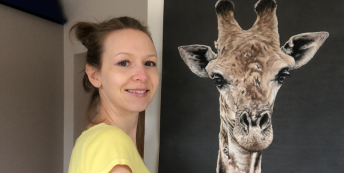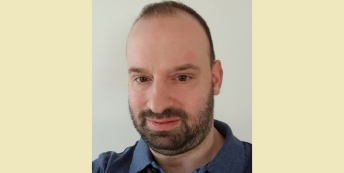“I often felt like I was banging my head against a brick wall.”
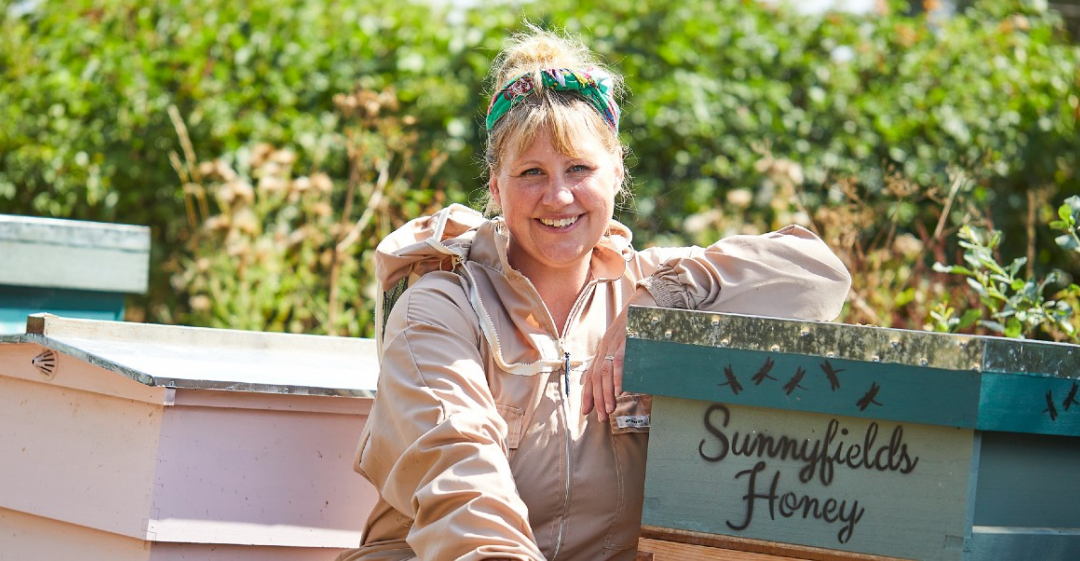
Newly Updated
What work were you doing previously?
I was a brand marketeer, specialising in brand marketing for food and drink companies predominantly.
It was a varied and fast paced life, and at times glamorous; working on photoshoots, television adverts, experiential marketing, and with celebrities.
I was responsible for multi-million pound budgets and got to see my marketing campaigns on national television, along with seeing the products in my corner shop and the supermarket!
What are you doing now?
I am now a professional beekeeper, working in the countryside with nature.
My business is Sunnyfields Apiaries Limited. I will have been working for myself for five years in a couple of months’ time. The aim of my business is to help educate people about bees through the use of the honey bee as a window into the world of pollinators.
I run bee experiences for individuals as well as beginner beekeeper training and mentoring. I also work with businesses who sponsor hives with me, and who come for team building days to the apiary.
How did you feel in your work before you decided to make the change?
I was increasingly frustrated with the politics that needed to be played in order to get the job done.
I would bring my frustrations home and run over and over the nonsense and annoyances from the day. I didn't enjoy going to work very much as I didn't feel valued or respected. I often felt like I was banging my head against a brick wall.
I also felt that life was passing me by a bit.
Why did you change?
I started to get ill.
I had terrible headaches and stomach cramps, and ended up visiting the hospital for investigations to find out what was wrong. I was crying a lot too so my mental health was poor.
It all turned out to be stress-induced.
How did you choose your new career?
I had started beekeeping as a hobby a few years prior to the leap into the unknown!
I have a lot of hobbies but this one quickly became an obsession. I was always thinking and talking about the bees, and how incredible they were.
I knew that there were a few (approx. 450 according to the Bee Farmers Association) commercial beekeepers in the UK and did some research. It turned out most had hundreds if not thousands of hives and predominantly focused on honey production. I thought this was worth a go but at the same time wanted to find my own angle and point of difference.
I considered how when I had started beekeeping there hadn't been many opportunities to visit bees without doing an in-depth course, so I came up with the idea of creating experiences with the bees.
With that in mind, along with the honey and also making things from the beeswax I jumped in!
Are you happy with the change?
Absolutely.
It's hard work and even five years later I still don't make anywhere near the earnings I did when I was employed, but I am so much happier and satisfied.
The physical signs of stress rarely appear and I'm in a much healthier mental place too.
Although I'm always busy, my time is my own and I can flex it however I see fit. For instance, I have two dogs that I like to take training and I can do this regularly in the middle of the week, rather than having to squeeze everything into a weekend.
What do you miss and what don't you miss?
I miss working with others and sharing the load.
I miss someone else's budget to spend and not my own, and I miss the size of budgets I used to work with.
I also miss being able to buy my lunch from a coffee shop or nice canteen but that's not the end of the world!
I don't miss the politics. I don't miss going into an office or being accountable to someone else and their opinions.
I certainly don't miss that knot in the pit of my stomach and the accompanying nausea.
How did you go about making the shift?
On my 40th birthday my husband and I discussed what I should do next, and we decided a break was in order, followed by a change of pace.
At the time we considered interim marketing work and also whether the bees could help me earn a living.
I handed in my notice with the intention of working out the month and then taking some time out to build some ideas for the bees.
Instead, when I handed in my notice my boss panicked and asked me to stay. I offered to work as a freelancer for a few months until they found a replacement, but I ended up staying for eighteen months on fewer days and more money.
The remaining time was spent building the bees. I also took on a few ad hoc marketing consultant jobs when opportunities arose as the money was good and that could be used to build the bee business.
I was busier than before, but because things were more on my terms I wasn't as stressed and handled things much better.
How did you develop (or transfer) the skills you needed for your new role?
A lot of my brand management skills are regularly used in my business today.
Brand management requires a good knowledge of business, logistics, managing P&L, innovation and NPD, people management and communication, agency management and of course marketing.
It stood me in good stead to launch my own venture having launched or worked on so many brands for others, and seen where things can go right and wrong.
How did you handle your finances to make your shift possible?
As mentioned, I freelanced for small businesses that needed some marketing support.
We also had the income from my husband's job too.
Unfortunately I fall into a category that seems to go through the grant gap, as some see me as agricultural but I'm not agricultural enough for their financial support!
What was the most difficult thing about changing?
I have a couple of answers to this depending on how you look at it and when.
When the decision to change was made, the most difficult thing was accepting that the future was going to be uncertain and that anything could happen next.
Basically going without the safety of an employment contract was a hard thing to stomach: no time off paid sick, no paid holiday, no guaranteed pay packet at the end of each month!
Now, the most difficult thing about changing is the fact that even if you have a supportive partner or loved ones, unless they've made the leap into this new world too, you can feel quite alone at times.
Working without colleagues to bounce ideas off or without someone to share the job list with is lonely. I recently started using AI to help me work through blocks; I can't afford someone on the payroll yet, so this is a good substitute for now.
And even if you have a supportive partner to talk things through with, like I do, the weight of the success of the business is on my shoulders and it's up to me to get it done.
What help did you get? 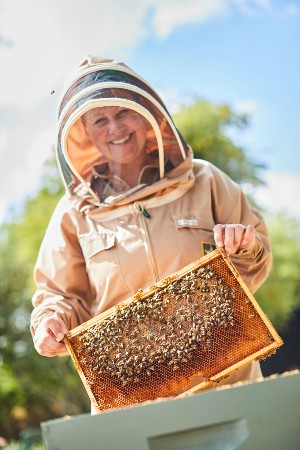
I used my contacts in the design world to help create my brand but everything else for the business was up to me.
I tried networking but it wasn't really for me and I didn't get much back from the meetings.
So I guess the most support was from my husband, with his willingness to let me take a few risks.
What have you learnt in the process?
I am stronger and more resilient than I realised.
What would you advise others to do in the same situation?
This is a hard one to answer, as we’re all so different that what's right for one person isn't necessarily going to be right for another.
I think my advice to anyone looking to take a leap into working for themselves is to do something you’re passionate about, something that you still won't mind working on in ten years time. You probably won't make a fortune but you’ll realise that there’s a better balance to have in life.
If you work for yourself, go into it knowing that you’ll probably end up doing all the jobs you currently ask others to do, from cleaning to finance to marketing and beyond.
For me my business is part of me, so when a five-star review appears after one of my bee experiences I get a genuine high. Equally if something goes wrong or I make a mistake, there's no one else to blame as it's just me.
These ups and downs mean that each day, week, month or year is different with different challenges and successes. For me this is what keeps it interesting, and keeps me pushing for more and for better!
We caught up with Stacy recently to see how her shift was working out, roughly a year and a half on. Here's what she's been up to, and the biggest lessons she's learned.
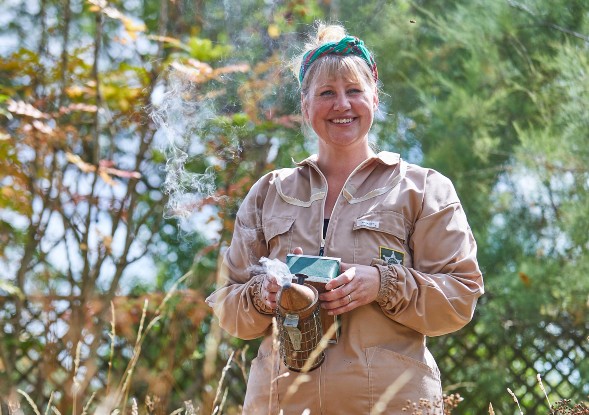
What's changed for you in your career since we first published your story?
I'm still working for myself!
We've added a shepherd's hut to the site which we rent out, so that's another way I spend my time. But otherwise I'm continuing to push the business forward.
I've been self employed for over 6 years now (which is fantastic as it's the longest I've stuck at the same job!).
How do you feel about your work now?
I still love being self-employed.
There have been times when money has been tight and we (my husband and I) have discussions around whether I should work for someone else again, but I can't imagine going back to a normal career!
What challenges have you come up against since making your shift, and how exactly have you dealt with them?
Keeping ahead of competitors has probably been the most challenging.
I've found my work and ideas being copied and although flattering, it's also frustrating. The economy hasn't been great in the past few years and so coming up with new ideas and ways to improve and grow has been a challenge as I don't want to fall into the same things everyone else does.
I've got help when I needed it, consulting experts when I feel stuck and need help finding clarity.
I recently launched a series of nature-inspired craft workshops which has boosted the bank balance and also exposed me to a new audience that wouldn't have come across my business before.
How is the financial side of things panning out, and is this what you'd expected?
Financially running a small business is difficult.
With the economy being as it has been the past few years I've found earnings would be substantially down if I hadn't continually tried to diversify and try new things.
What have you learned, since making your shift?
That being self-employed is not the easy life, but it certainly is a more balanced one.
It allows you to realise what's most important in life.
To find out about Stacy's business, visit www.sunnyfieldsbees.com
What lessons could you take from Stacy's story to use in your own career change? Let us know in the comments below.

